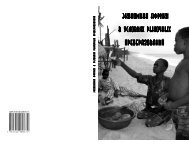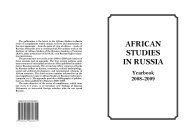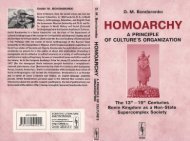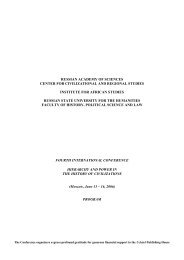L. Fituni, I. Abramova Resource Potential of Africa and Russia's ...
L. Fituni, I. Abramova Resource Potential of Africa and Russia's ...
L. Fituni, I. Abramova Resource Potential of Africa and Russia's ...
You also want an ePaper? Increase the reach of your titles
YUMPU automatically turns print PDFs into web optimized ePapers that Google loves.
tion in the global division <strong>of</strong> labor which is very similar to that <strong>of</strong><br />
<strong>Africa</strong>.<br />
Since approximately the beginning <strong>of</strong> the 2000s, Moscow has<br />
been desperately trying to change this situation, but encounters<br />
strong resistance from old rivals (now main buyers <strong>of</strong> its export<br />
commodities), new competitors (which develop more dynamically<br />
<strong>and</strong> are more adroit <strong>and</strong> agile in occupying new opening market<br />
niches) <strong>and</strong> indigenous oligarchs, whose fortunes depend on the raw<br />
material specialization <strong>of</strong> their country. In may be a coincidence, but<br />
the general “disappointment” <strong>of</strong> the West with the end results <strong>of</strong><br />
democratization processes in Russia coincided with the shift in the<br />
Russia’s attitude <strong>of</strong> its subordinate role in the international division<br />
<strong>of</strong> labor.<br />
Though on the whole Russia’s metamorphosis at the end <strong>of</strong> the<br />
20th century was disappointing, that cloud had some silver lining<br />
too. In the 21st century, the global economy began to experience a<br />
more pronounced relative shortage <strong>of</strong> various kinds <strong>of</strong> natural resources.<br />
That means that international market prices are due to increase,<br />
thus broadening the opportunities for mobilizing the savings<br />
for development.<br />
But with that came the first signs <strong>of</strong> the so called Dutch disease,<br />
though in our view it was a very specific type <strong>of</strong> the illness.<br />
In accordance with the classical economic theory, in simple<br />
trade models, a country ought to specialize in industries that it has a<br />
comparative advantage in. So, theoretically, Russia, as a country<br />
rich in natural resources, would be better <strong>of</strong>f specializing in the extraction<br />
<strong>of</strong> natural resources. But it is not. The reliance on natural<br />
resources under a free reign market economy is slowly killing the<br />
national manufacturing industries by making any investment alternative<br />
to mining less attractive. This challenge was manageable under<br />
the Soviet planned economy, since then it were the non-market factors,<br />
that determined the areas, types <strong>and</strong> levels <strong>of</strong> investment. At<br />
that time Gosplan’s decision making was based on the priority <strong>of</strong> the<br />
macroeconomic efficiency <strong>of</strong> the Soviet economy as a whole. For<br />
that it was prepared to sacrifice the level <strong>of</strong> pr<strong>of</strong>itability <strong>of</strong> individual<br />
projects <strong>and</strong> even whole branches. The balanced development <strong>of</strong><br />
61







